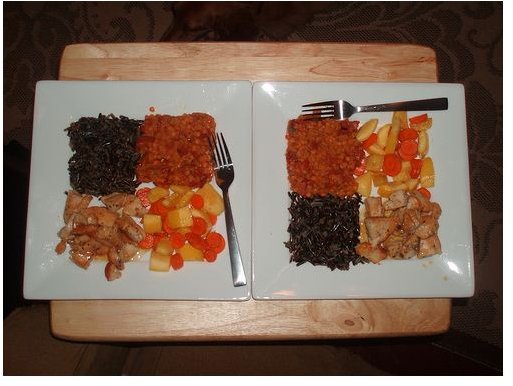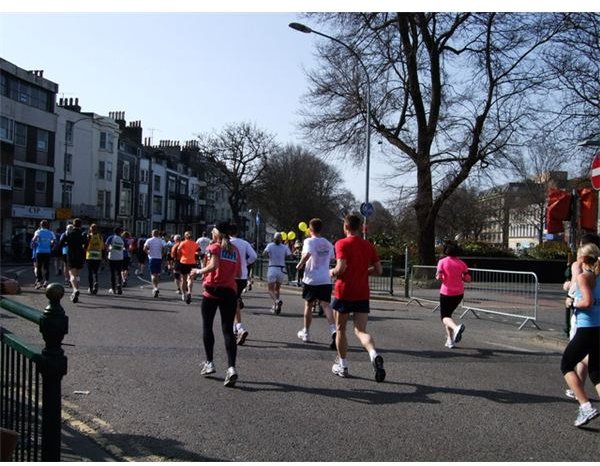Ingredients of a Successful Meal Plans for Runners
Some athletes don’t focus as much on nutrition as they should. They are burning a lot of calories, so it is tempting to eat a lot of junk food to fill up. However, runners make a lot of demands on their body, and need to pay close attention to their diet to make sure their getting enough nutrients to give them energy, and repair muscle damage. A healthy meal plan for runners entails optimal intake of carbohydrates, proteins, vitamins, minerals, and other nutrients, besides water and salt, and adopting overall good eating habits.
Carbohydrates
Any good meal plan for runners should include a large amount of Carbohydrates, as they’re your primary energy source. Once digested, carbohydrates break down into blood glucose, providing the runner with much needed energy.
Food that score low or medium on the glycemic index constitute the most effective carbohydrates, because they break down more slowly and will provide energy for longer. The glycemic index ranks foods based on how quickly carbohydrates break down into blood glucose. Low glycemic indexed foods include whole-wheat flour products such as brown bread, wheat pasta, brown rice and the like; unprocessed cereals such as oats, pasta, pulses, and long grain rice; and fruits such as apples and bananas. These types of carbs provide the body with much needed energy during running and aid in removing toxins from the muscles post running.
High glycemic Index foods such as sugar, short grain wheat rice, confectionery and white bread are not ideally suited for runners. Consumption of these foods depletes the runners’ body of B-complex and calcium. Such foods are however recommended post running, for they replenish the depleted energy at a fast pace.
Proteins
Protein aids in better absorption of nutrients, helping the runner retain energy for longer durations. It also facilitates quicker recovery of the body muscles post running.
The optimal protein intake for runners is one gram per kilogram of body weight. Vegetarians would do well to increase protein intake beyond this limit, but excessive consumption of protein can lead to harmful side effects such as dehydration and kidney damage.
Some good protein sources include lean meats, chicken, turkey, fish, soy, nuts, beans, and tofu, low fat yogurt, and cottage cheese. Some fruits and vegetables also have high amounts of protein, like avocados.
Vitamins and Minerals
Runners require calcium to add strength to their bones, and vitamin E to add flexibility to their joints. Other essential vitamins include B complex, that accelerates the absorption of carbohydrates from food sources and aids in muscle recovery, and vitamin C that boost immunity. Most food sources rich in carbohydrates and proteins include vitamins and minerals essential for runners, and additional vitamin supplements are rarely required.
Water and Salt
Maintaining hydration level is of critical importance for runners. Body muscles generate heat during exercise, and the runners’ body generates sweat composed of water and dissolved minerals such as sodium to cool off this heat. Failure to replenish water and minerals causes dehydration, which in turn causes fatigue, muscle cramps, heatstroke and even death.
It is not enough that the runner drinks water before, during and after a running session. It is rather important to keep the hydration level topped all the time, for feeling thirsty itself is a symptom that dehydration has already taken place. Long distance runners may require water with salts at frequent intervals.
Many use drinks such as gatorade or powerade which contain sodium. Another option is to drink a mix of water and bananas before the run and one hour after the run. This will replace the sodium lost through sweat, especially when the run extends over ninety minutes.
Good Eating Habits

A successful meal plan for runners is not limited to loading the menu with the right type of carbohydrates, proteins and minerals. A good meal plan also ensures that the runner’s nutrition is in correct proportion to keep energy levels constant.
As a rule of thumb, a runner’s diet needs to contain 50% complex carbohydrates, 30% protein, and 20% fat. Overweight runners could reduce carbohydrates to 33% and incorporate fluids in the remaining portion.
A good meal plan feature small meals every three hours instead of two or three huge meals a day. Small portions provide a stable amount of energy throughout the day, help maintain fast metabolism and prevent overeating.
Sample Menu Options
The following are some of the suggested meal plans for runners:
Breakfast:
- Oats porridge with linseeds, skimmed milk and tsp sugar
- Toasted Granary Bread with olive oil based spread and peanut butter
- Egg burrito with cheese
- Whole wheat wrap with spinach, peppers, garlic
Lunch:
- Sandwich made with granary bread with olive oil based spread and lean ham, chicken or large mackerel fillet
- Turkey with whole wheat bread, and spinach, tomato, and avocado
Dinner:
- Lean fillet steak or chicken breast or fish with herbs to taste
- Boiled new potatoes or dry roasted sweet potatoes or whole-wheat pasta
- Loads of vegetables
- Salmon (approximately 3 oz) topped with tomatoes and asparagus
- Low fat, no added sugar yogurt
Recommended mid-meal snacks could include:
- Oatcakes with cottage cheese
- Mixed Nuts
- Crackers
- Fruits such as Apple, Orange and Banana
Water, Green Tea, Skimmed Milk and Fruit Juice constitute the recommended finishers after every meal or snack.
Irrespective of the menu options, runners would also do well to eat a wide variety of fresh green salads before meals to balance acidity.
The success of meal plans for runners depends not only on adherence to the recommended menu that incorporates the essential nutrients, but also on reduction of unhealthy fried foods, alcohol, dairy products, sweets and excessive salt.
Adherence to a meal plan helps the runner stay healthy and aid in speedy post run recovery, making running an enjoyable exercise.
Disclaimer:
This article does not constitute medical advice. Readers may take professional help before acting on the information contained in this article.
References:
- Ratzin Jackson, Catherine G (1994). Nutrition for the Recreational Athlete. ISBN 0-8493-7914-8.
- Smart Running (April 2008), Boston Running Center: https://www.bostonrunningcenter.com/sr/april08/webversion.html
Image Credit:
- Page 1: geograph.org.uk/Paul Gillett
- Page 2:flickr.com/Pretty Poo Eater
